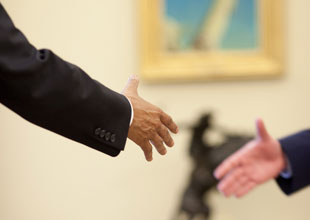
White House photo/<a href="http://www.flickr.com/photos/whitehouse/3683212777/">Pete Souza</a> (<a href="http://www.usa.gov/copyright.shtml">Government Work</a>).
As the battle over financial reform intensifies—now that there’s a Senate bill in play—how tough will President
Obama often meets with Wall Street execs—especially Jamie Dimon, the CEO of JPMorgan Chase. White House visitor logs show that Dimon came to the White House six times in the first six months of Obama’s presidency. Last month, Dimon and several other corporate honchos dined at 1600 Pennsylvania Avenue with the president.
But Dimon has been one of the leading foes of creating a consumer financial protection agency that would write and enforce rules governing financial products, such as credit cards and mortgages. Establishing such an outfit—either as a standalone agency (as the House voted to do last year) or as part of the Federal Reserve (which the Senate bill unveiled by Democratic Connecticut Sen. Chris Dodd, the Senate banking committee chairman, would do)—is a central component of the financial reform package that Obama is pushing. So, shouldn’t Obama be leaning on Dimon and other execs to soften their opposition?
At Tuesday’s daily White House press briefing, I asked press secretary Robert Gibbs:
The president has met recently…with Jamie Dimon. Has he asked him, and other executives, to ease up on their opposition to having a consumer financial protection agency? And also—I’ll do two at once here—have Larry Summers and
Tim Geithner been brought in to talk to their former Wall Street colleagues about their opposition to having such a bureau or agency?
Gibbs didn’t say yes to either query:
Well, I’ll just say this. The president used the occasion of [Dimon and other corporate leaders] being here last year on small business lending to talk about not only the consumer financial protection agency but also overall financial reform. We believe it is in the interest of the American people to set rules of the road to give—to empower consumers with the information they need, and to do so in a way that doesn’t carve out certain lenders like payday lenders or things like that in protecting consumers.
I don’t know whether Larry and Tim have talked with anybody on Wall Street in the past 24 hours since Senator Dodd introduced his legislation. I do know that the [National Economic Council] and the Treasury Department were indeed working with, and have been working with, Senator Dodd over the past many weeks on the legislation that he introduced yesterday.
Obama has repeatedly said he wants to see a strong consumer financial watchdog on the beat. But advocates for such an agency worry that the president isn’t using his muscle with the corporate execs fighting him on this front—especially the ones with whom he hobnobs. One advocate says, with Dimon in mind, “Why does the president keep having a guy over for dinner that is spending millions to kill his signature reform plan? That’s certainly a huge carrot, but what sticks are they using? It doesn’t seem like they’re focusing whatever capital they have with the industry on consumer issues.” This person, who wished not to be identified so as not to anger the White House, notes, “We’ve heard that the big institutions don’t feel like the president has ever really turned the screws on them about CFPA or lobbying behind closed doors. He’s never said to them, ‘You have to stop lobbying against consumer, or else X, Y, and Z.’ He hasn’t been bad cop.”
Gibbs did not
The president…is committed to a strong consumer agency. He will seek opportunities as it relates to the overall bill to strengthen it, and will fight, as he said yesterday, any effort to weaken the legislation that he believes, again, provides very clear, commonsense rules of the road so that the American people are never on the hook for the excesses of Wall Street banks.
This was something of a low-key response. Gibbs did not embrace the opportunity to declare that the president would fight like hell—even if that meant facing down the CEOs and their lobbyists—to ensure the creation of a strong consumer financial protection unit. Perhaps the time for such fighting words will come. But anytime the White House has the chance to take a poke at the banks and chooses not to do so, consumer advocates worry about the prospects of setting up a strong watchdog.
When it comes to the consumer financial protection shop, Obama has displayed a decent outside game. But to get this passed over the objections and maneuverings of scores of Wall Street lobbyists, it wouldn’t hurt for him to work the inside—especially that guy from JPMorgan.











